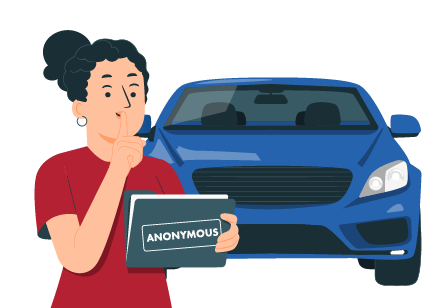Can I Get Anonymous Car Insurance Quotes?
While there is no such thing as a fully anonymous car insurance quote, you can get an estimate using online tools without sharing personal details. These rough estimates will give you an idea of the average costs. Still, you must provide your driving history and contact details to get accurate insurance quotes and coverage.
Who Gets the Most Accurate Anonymous Quotes?
Anonymous car insurance quotes are more accurate under certain conditions, especially when minimal personal risk factors and insurance market conditions are stable. By comparing auto insurers and their insurance products, drivers can get a cheap car insurance rate estimate without disclosing all details upfront.
Anonymous car insurance quotes will be close to the quoted premium if you follow the guidelines below.
Clean driving record - No prior violations, at-fault accidents, or claims. People without a driving history will get car insurance quotes that match the anonymous estimate.
Standard insurance requirements-Drivers who don't need an SR-22 or are not high-risk. People who don't need an SR-22 or are not high-risk will see minimal difference between the estimate and the actual auto insurance quote.
Stable regulatory environment - Residents of states with predictable and standardized insurance markets will see more accurate estimates.
Good credit history - Since most auto insurance companies use credit scores (except in California, Hawaii, Massachusetts, and Michigan), a good credit score will keep car insurance quotes consistent.
Conversely, anonymous car insurance quotes will be far from the actual quote if you have any of the conditions listed below.
Driving history - Drivers with at-fault accidents, tickets, or DUIs. People with a bad driving history will see significant differences due to the impact of driving history on the insurance premiums calculation.
High-risk status or SR-22 requirement - Standard online quote calculators don't include surcharges for non-standard coverage options.
Complex insurance markets - States with high claim rates, insurance fraud concerns, or unique laws (e.g., no-fault laws in Michigan and Florida) will see insurance quotes underestimating the actual cost.
Poor credit score (where applicable) - In states where credit is used to price auto insurance, lower credit scores will result in more significant differences from the initial online insurance quote.
How to Get a Car Insurance Quote without Personal Info or Phone Calls
Getting an online car insurance quote without giving out personal information or getting phone calls is a top concern for privacy-conscious customers. While entirely anonymous quotes are rare due to insurance industry requirements, you can get reasonably accurate quotes by minimizing the data shared and using the right tools.
Customers need to know what information is needed, how to provide it discretely, and which websites protect your privacy.
1. Know the Minimum Required Information for a quote
To get auto insurance rates without phone calls, you need to provide insurance companies a few basic details listed below.
ZIP code or garaging address - Determines regional risk and pricing.
Age and date of birth - A significant factor in insurance premium calculations.
Vehicle details - Year, make, model, and Vehicle Identification Number (VIN).
Driving history - A general record of past violations or insurance claims.
Prior insurance status - Especially if applying for coverage continuity discounts.
Some car insurance companies may allow quotes without a driver's license number or full address, but omitting too much information can reduce accuracy. Comprehensive, high liability limits or additional coverages require more detailed information to reflect actual insurance costs.
2. Use Comparison Tools and Estimators Wisely
Online quote comparison websites and insurance calculators are the easiest way to get multiple car insurance quotes without repetitive data entry. These tools perform various functions listed below.
Ask for general non-sensitive info (e.g., ZIP code, vehicle type, age range).
Return side-by-side quotes from multiple providers using that limited data.
Vary in privacy protocols, insurance comparison tools that provide car insurance quotes directly are better than lead-gen sites that share your information with third parties.
Car insurance calculators or estimation tools offer simple inputs and quick quotes for a rough estimate only. These are great for research only but lack the precision of full underwriting of an auto insurance policy.
3. Limit Personal Info, But Be Accurate
You can withhold some data, like your Social Security number or full name, but accuracy is key in the information you provide. Wrong ZIP codes, birthdays, or car specs can change your monthly rates by hundreds of dollars.
To be private without sacrificing functionality, follow the suggestions listed below.
Use a secondary email address for quote requests.
Don't include phone numbers unless required.
Be transparent with the essential info to ensure quote accuracy.
While entirely anonymous is not possible, you can manage how much personal information you share. Be careful when sharing data with online tools so you can compare quotes quickly and privately.
What Information Do I Need to Get Accurate Auto Insurance Quotes?
To get an accurate car insurance quote, insurance companies need to look at a variety of factors to analyze your driver profile. This helps them figure out the risk and cost of insuring you.
Whether using an online comparison tool or applying directly with an insurance company, you need to give them specific information. This information includes info about you, your household, and your car. This affects your eligibility for car insurance coverage and the rate you are offered.
1. Personal and Demographic Information
Insurance companies use demographic data to assess risk levels.
Some factors are restricted in certain states, but the personal information commonly asked for is listed below.
Full name and date of birth - To identify the applicant and assess risk based on age.
Home address or ZIP code - To determine regional risk factors such as accident rates, car theft, and weather-related claims. Note that some states like California, Hawaii, Massachusetts, and Michigan restrict or prohibit ZIP code use as a rating factor.
Marital status - Statistically, married drivers are at lower risk and get cheaper rates.
Drivers license number - Proof of a valid drivers license and to retrieve your driving history from the Department of Motor Vehicles.
Driving history - Past at-fault accidents, traffic violations, or insurance claims that impact your the price of your insurance premium.
2. Vehicle Information
Information about your type of vehicle helps insurance companies evaluate safety features, repair costs, and replacement value. You will need to provide the following details listed below.
Year, make, and model of the vehicle - To assess vehicle safety and repair costs.
Vehicle Identification Number (VIN) - To confirm the exact specifications and history of the car.
Ownership status - Whether the vehicle is owned, leased, or financed may affect the types of coverage required.
Annual mileage and usage - How far and for what purpose you drive affects risk and cost.
3. Coverage Types and Your Insurance History
The coverage types and coverage amounts affect the price of your insurance quote. The different variables that are analyzed are listed below.
Desired coverage types - Minimum liability insurance, full coverage car insurance, or custom full-coverage policies with comprehensive and collision coverage.
Coverage limits and deductibles - Higher liability limits and lower deductibles mean higher car insurance rates.
Prior insurance coverage - Having continuous insurance coverage gives you lower rates. Lapses in coverage will almost always raise your car insurance rates.
4. Additional Optional Information
Some insurance companies may ask for additional information to give you a better and more accurate quote. The additional information they may ask for is listed below.
Vehicle safety features - Anti-theft systems, airbags, and driver assistance technologies may qualify for insurance discounts.
Credit score - Used in most states (except where restricted) to assess financial responsibility, checked later in the quote or purchase process.
Social Security number - Only sometimes required when you buy the auto policy.
By providing accurate and complete information during the quote process, you allow insurance companies to give you a quote that is close to your actual premium. People who practice safe driving will usually get cheap car insurance easily. However, omitting information will result in incorrect quotes or coverage issues later.



